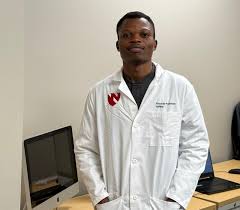
US-based Nigerian researcher develops AI model to aid cancer treatment
A new phase in the battle against drug resistance in cancer treatments has begun with the development of a sophisticated artificial intelligence model by Kayode Raheem, a Nigerian researcher living in the United States, that can predict with surprising precision how cancer cells would respond to treatment.
Raheem, a PhD candidate in Bioinformatics and System Biology at the University of Nebraska Medical Centre in the United States, said in an interview that his recently created model, SpatioMorph-Rx, is revolutionary in terms of therapeutic accuracy.
The AI-driven platform maps drug sensitivity at a single-cell level by integrating two intricate biomedical datasets, the scientist said in reference to his study work published in the American Association for Cancer study.
The clinical necessity to address cancer patients' resistance to treatment gave rise to this effort.
He stated, "We needed to know not only which cells were resistant, but also why, and more crucially, where they were located inside the tumor."
According to Raheem, whose innovative work combines artificial intelligence, computational biology, and spatial omics, SpatioMorph-Rx works similarly to a digital microscope and can zoom in on individual cells to see how they could respond to particular medications, such the common chemotherapy drug cisplatin.
According to the researcher, the model detects cellular hotspots where resistance mechanisms are active by using single-cell gene expression data and high-resolution histology pictures.
He pointed out that these resistant cells have distinctive molecular and morphological traits and frequently group together in different areas of a tumor.
"We are basically providing oncologists with a forecast map of resistance," he clarified.
“That allows for better targeting of therapies and ensures that patients don’t undergo toxic treatments that are unlikely to work for them.”
A graph-based domain adaption framework, a complex artificial intelligence system that learns from pharmacogenomics data derived from preclinical cancer cell lines and applies that knowledge to actual patient data, is the foundation of Raheem's model.
He disclosed that the technology effectively detected drug-resistant and drug-sensitive zones inside tumor samples after being evaluated using datasets related to non-small cell lung cancer.
"SpatioMorph-Rx integrates both modalities, in contrast to earlier models that mainly rely on either genetics or imaging alone," he continued.
"We use deep learning models like CTransPath to analyze morphological patterns and principal component analysis (PCA) to derive transcriptome markers."
He clarified that adversarial training further improves the hybrid system by enabling it to align various datasets across platforms, reduce technical noise, and make the AI speak the same biological language across a variety of data types.
The scientist pointed out that his novelty is in making the technology interpretable, but emphasized that his study is more about the combination of AI and spatial biology.
According to him, the model uses Explainable AI methods, such Shapley Additive Explanations, to analyze which genes and characteristics of visual cells influence predictions.
Clinicians must have faith that the model is not just accurate but also comprehensible. We demonstrate to them which morphological and molecular biomarkers are involved in resistance," he said.
Raheem disclosed that he is investigating how these same computational frameworks can speed up the identification of new medicines from natural sources in addition to measuring the response of cancer drugs.
He stressed, “Nigeria has incredible biodiversity. By integrating AI into the search for anti-cancer agents from our local plants, we’re turning natural compounds into scientifically validated drug leads.”
Speaking about a different research project that centered on creating customized neoantigen mRNA vaccines for breast cancer, Raheem said he detected tumor-specific mutations in Pakistani breast cancer patients using next-generation sequencing data and created a vaccine that used immune-informatics, molecular docking, and simulations to elicit specific immune responses.
The goal was to customize a vaccination to each patient's unique mutational profile.
"We can create a safer, more effective cancer vaccine that targets the immune system exactly where it is by anticipating the most immunogenic neoantigens," he said.
When applied rigorously to biomedical data, he emphasized the revolutionary potential of AI, whether it is in creating customized vaccines or mapping the landscape of resistant malignancies.
Raheem, a member of a new generation of African scientists spearheading top-tier biomedical research from the continent, was born and raised in Nigeria.
His academic path, which has its roots in systems biology, has continuously advanced the understanding of how biology and data interact to propel medical advancement.





